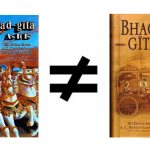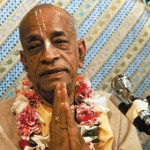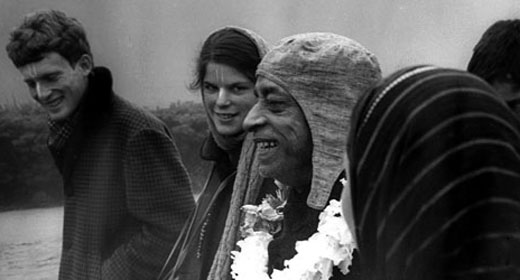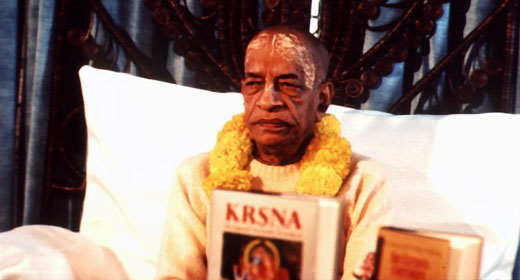The “defense” Jayadavaita Swami uses in justifying his changes to Srila Prabhupada’s Bhagavad-gita As It Is is “I have made it closer to the original manuscript…” This is not a good defense.
Just imagine if I write a book and find an editor I trust and and give him the service of editing my manuscript for publication. I work with the editor, answering his questions and give him guidance on how to edit the book. Then I supervise all aspects of the production of the book and see and approve of the final blueprint. When the book is printed, it is that book which is the authorized and authoritative version of my book. Not my first manuscript.
If later on someone finds my first manuscript and notes that there are some differences in the first manuscript to the printed book and he decides to “correct” my book back to my original manuscript he is doing me a great disservice.
The whole idea of having an editor and working with him to produce the final book is to produce something which will be somewhat different from the original manuscript. If Prabhupada wanted to publish his original manuscript, unedited, he could have done that. But, no, he appointed an editor and worked with that editor to produce the final result and he was very happy with the published book.
So the whole justification of the ISKCON book changes is completely wrong. The authoritative version of Srila Prabhupada’s Bhagavad-gita As It Is is the 1972 Macmillan Complete Edition. Not the so-called “original manuscript.” The 1972 Macmillan Complete Edition is the book used by Srila Prabhuapda personally on a daily basis for his reading and for giving all his Bhagavad-gita classes from. Srila Prabhuapda read his whole published Bhagavad-gita As It Is many times and he had his disciples read large sections of it out aloud which he would comment on during class. And these Bhagavad-gita readings with commentaries by Srila Prabhuapda were recored.
In the six years from 1972 to 1977 Srila Prabhuapda only mentioned two or three things he wanted corrected in his Bhagavad-gita As It Is, however at no point did he ever authorize anyone to “revise and enlarge” it. And this fact is openly admitted by the BBT.
Prabhuapda did not give anyone the authority to change his Bhagavad-gita As It Is. But the BBT changed it anyhow. This Prabhuapda referred to as the “American disease.” Change, change, change. This constant change is very destructive to spiritual life.
Understanding this point, that the manuscript is not the authority but the printed 1972 Macmillan “Complete Edition” is, still I was a little interested to see if it was actually true that Jayadvaita’s changes to Bhagavad-gita As It Is, make it closer to the original manuscript. Here are some of the changes I have mentioned in the past[these are the ones from the “108 Changes article“] along with what Jayadvaita Swami calls the “original manuscript.”
This short study clearly shows that although there are some cases where he has “made it closer to the manuscript” in the majority of cases Jayadvaita Swami’s changes are not connected with or supported by the original manuscript at all. And there are so many differences in the manuscript that he does not change. So the manuscript is obviously not the reason for his changes and this defense “I have simply made it closer to the manuscript” is a smokescreen only, an attempt to cover up why he really made these changes.
Bg 2.8 P ORIGINAL 72 GITA:
…they can achieve real happiness only if they consult Krsna, or the Bhagavad-gita and Srimad-Bhagavatam–which constitute the science of Krsna–or the bona fide representative of Krsna, the man in Krsna consciousness.
Bg 2.8 P REVISED & ENLARGED:
…they can achieve real happiness only if they consult Krsna, or the Bhagavad-gita and Srimad-Bhagavatam–which constitute the science of Krsna–through the bona fide representative of Krsna, the man in Krsna consciousness.
This change has absolutely no justification in the manuscript. The original translation follows the original manuscript. Original manuscript says one can be happy if he consults Bhagavad Gita or Srimad Bhagavatam which constitute the science of Krishna from the bona fide representative of Krishna [which means you can achieve real happiness by consulting Bhagavad Gita or Srimad Bhagavatam if it is presented by the bona fide representative of Krishna, so the books are only good if presented by a bond fide representative of Krishna, like Prabhuapda’s books are] OR the man in Krishna consciousness. The original translation puts it slightly differently but still comes up with the same conclusion, the same philosophy, howerver JAS is giving us a completely different conclusion. So as far as I can see that “-from the bona fide representative of Krishna” in the manuscript is saying that the books have to be from the bona fide representative of Krishna, and the second part is OR the man in Krishna consciousness. There is no question about the philosophy here. That is correct.The book Bhagavata and the person Bhagavata are the same and one can get the same benefit either from the book Bhagavata or the person Bhagavata. This idea is presented in Prabhupada’s original Gita, but not JAS’s edition. So according to JAS’s presentation you can not get real happiness from the Bhagavatam or Bhagavad-gita book, you can only get this “through the man in Krishna consciousness.” This is a very misleading and philosophically incorrect presentation. The book Bhagavata has to be presented, means written, by the bona fide representative of Krishna, so one can become completely Krishna conscious by reading this book Bhagavata which has been written by the bona fide representative of Krishna. JAS’s translation makes it appear that this is not possible. Therefore it is presenting incorrect philosophy, even though it may seem to be an attempt to make it closer to the original manuscript, he has made the philosophy incorrect.
Bg 2.18 P ORIGINAL:
…The body itself is unimportant. Arjuna was advised to fight and to sacrifice the material body for the cause of religion.
Bg 2.18 P REVISED & ENLARGED:
…The body itself is unimportant. Arjuna was advised to fight and not sacrifice the cause of religion for material, bodily considerations.
This change has absolutely no justification in the manuscript. The original translation perfectly follows the manuscript. The original manuscript clearly says “Arjuna was advised to fight without consideration of the material body and sacrifice [it to] the cause of religiosity.” That is exactly what the original translation says with slightly better wording. However what JAS has put is completely meaningless gobbledygook. What on earth does it mean to “fight and not sacrifice the cause of religion for material, bodily considerations???” It is a completely meaningless and confusing statement. Here JAS is clearly tying to change something that appeared in the original manuscript. Original manuscript clearly says Krishna asked Arjuna to fight without consideration of the material body and to sacrifice it to the cause of religiosity. You can not find this anywhere in JAS’s Gita…
Bg 2.25 T ORIGINAL:
It is said that the soul is invisible, inconceivable, immutable and unchangeable. Knowing this, you should not grieve for the body.
Bg 2.25 T REVISED & ENLARGED:
It is said that the soul is invisible, inconceivable and immutable. Knowing this, you should not grieve for the body.
This change has absolutely no justification in the manuscript. The word “unchangeable” is clearly there in the manuscript in both the translation and the word-for-word meanings. But JAS has simply deleted it.
Bg 2.30 T ORIGINAL:
O descendant of Bharata, he who dwells in the body is eternal and can never be slain. Therefore you need not grieve for any creature.
Bg 2.30 T REVISED & ENLARGED:
O descendant of Bharata, he who dwells in the body can never be slain. Therefore you need not grieve for any living being.
This change has absolutely no justification in the manuscript. This is something of a mystery. You can see the manuscript really does not very closely resemble the original published edition, but more importantly it does not resemble JAS’s changed version either. We can only assume that there was some conversation with Srila Prabhuapda that resulted in this translation. In any case the original editors would have been justified in putting “eternal” into the translation on the basis that the word “nityam” appears in the verse and Srila Prabhuapda translates this to “eternally,” however Jayadvaita can not be justified in removing the word “eternal” from the translation as he says he changes Prabhupada’s translations to match the Sanskrit word-for-word. In this case he has changed the original translation and made it inconsistent with the word-for-word synonyms. There is absolute proof that Srila Prabhuapda accepted this verse, and the inclusion of “eternal” in the translation as it was presented in his original Bhagavad-gita As It Is, and you can read that below. So there is absolutely no reason whatsoever for JAS to remove the word “eternal” from the translation while otherwise keeping the version presented by the editors of the original edition that does not really appear to be very close to the original manuscript anyhow. This one verse is ample proof that JAS is not “making it closer to the original manuscript.” Here his translation is exactly like the Macmillan edition using the “he who dwells in the body can never be slain,” which does not appear in the manuscript, JAS has simply deleted the “is eternal” for reasons only known to him. The “eternal” is in the word-for-word, “nityam,” there is nothing wrong with the original editors putting it in the verse as is very clearly shown by Srila Prabhuapda himself below. It is only necessary to listen to Srila Prabhuapda’s classes to resolve all these points.
“O descendant of Bharata, he who dwells in the body is eternal and can never be slain. Therefore you need not grieve for any creature.”
Prabhupada: Dehi nityam avadhyo ‘yam dehe sarvasya bharata. Dehe, dehe means body, within the body. This topic began, dehino ‘smin yatha dehe kaumaram yauvanam jara. Deha, dehi. Dehi means one who possesses the body. Just like guni. Asthate in prata. The grammatical. Guna, in, deha, in, in prata. Dehin sabda. So the nominative case of dehin sabda is dehi. Dehi nityam, eternal. In so many ways, Krsna has explained. Nityam, eternal. Indestructible, immutable. It does not take birth, it does not die, it is always, constantly the same. Na hanyate hanyamane sarire. In this way, again he says nityam, eternal. (730831BG.LON) So here Srila Prabhuapda clearly confirms that the word eternal (nityam) belongs in this verse. But for some completely unknown reason, not supported by the manuscript, and not supported by Prabhuapda personally, JAS has decided to delete the word eternal…
Bg 2.31 P ORIGINAL:
…Discharging one’s specific duty in any field of action in accordance with varnasrama-dharma serves to elevate one to a higher status of life.
Bg 2.31 P REVISED & ENLARGED:
…Discharging one’s specific duty in any field of action in accordance with the orders of higher authorities serves to elevate one to a higher status of life.
I guess here it might be possible to argue that JAS has made it closer to the original manuscript. However my opinion on this is we should respect the original editors and it is not unreasonable to assume that the higher authority is the Varnasrama Dharma system since the whole purport is speaking of this Varnasrama system and the original editor may not have like to have it saying …higher authority… higher status of life. Such things that are philosophically and gramatically correct should not be changed to satisfy some pedantic editor. There is nothing wrong with the original at all.
Bg 2.40 P ORIGINAL:
If someone gives up self-gratificatory pursuits and works in Krsna consciousness and then falls down on account of not completing his work, what loss is there on his part?
Bg 2.40 P REVISED & ENLARGED:
If someone gives up his occupational duties and works in Krsna consciousness and then falls down on account of not completing his work, what loss is there on his part?
Here you may be able to make a case that JAS has made it closer to the manuscript. Maybe you could even make a case that this is a valid correction. But you see this is the first one so far and I am being impartial here. I am not just picking out the quotes for this presentation. I am going through ALL the quotes I gave in this “108 Changes” article and I did not look at the manuscript before writing that article.
Bg 2.48 T ORIGINAL:
Be steadfast in yoga, O Arjuna. Perform your duty and abandon all attachment to success or failure. Such evenness of mind is called yoga.
Bg 2.48 T REVISED & ENLARGED:
Perform your duty equipoised, O Arjuna, abandoning all attachment to success or failure. Such equanimity is called yoga.
The original translation to this verse has been very clearly approved by Srila Prabhupada personally and considering this to change it and delete points that Prabhuapda has stressed on so strongly is a great mistake and very offensive to Srila Prabhupada. Why the editors do not listen to Srila Prabhuapda’s classes before they butcher his books?
(7) When Tamala Krsna read the verse to Srila Prabhupada in 1968 (681216BG.LA) Prabhupada had this to say:
Tamala Krsna: “Be steadfast in your duty, O Arjuna, and abandon all attachment to success or failure. Such evenness of mind is called yoga.”
Prabhupada: This is the explanation of yoga, evenness of mind. Yoga-samatvam ucyate. If you work for Krsna, then there is no cause of lamentation or jubilation. Jubilation is there because you are working for Krsna, but there is no cause of lamentation. Yoga-sthah kuru karmani, yogah karmasu kausalam. That is the secret of activities, how you can very diligently work at the same time you are not entangled with the actions. That is the secret. Go on. So JAS has completely deleted this “evenneess of mind” from the verse, even though Prabhuapda clearly states that “this is the explanation of yoga, evenness of mind.”???
Bg 2.49 T ORIGINAL:
O Dhananjaya, rid yourself of all fruitive activities by devotional service, and surrender fully to that consciousness. Those who want to enjoy the fruits of their work are misers.
Bg 2.49 T REVISED & ENLARGED:
O Dhananjaya, keep all abominable activities far distant by devotional service, and in that consciousness surrender unto the Lord. Those who want to enjoy the fruits of their work are misers.
Here JAS is making it closer to the manuscript and he is backed up by the word-for-word synomyms also. This is perhaps the best example so far but I must admit to having an uncomfortable feeling about this manuscript page that seems to have been typed with two different typewriters. And I do not know how that would be possible?
Bg 2.51 T ORIGINAL:
The wise, engaged in devotional service take refuge in the Lord and free themselves from the cycle of birth and death by renouncing the fruits of action in the material world. In this way they can attain that state beyond all miseries.
Bg 2.51 T REVISED & ENLARGED:
By thus engaging in devotional service to the Lord, great sages or devotees free themselves from the results of work in the material world. In this way they become free from the cycle of birth and death and attain the state beyond all miseries [by going back to Godhead].
Here I guess you could say JAS is making it closer to the manuscript, however Prabhuapda has clearly aproved of the original translation below so JAS’s jumbling of words is completely unnecessary.
Tamala Krsna: “The wise, engaged in devotional service, take refuge in the Lord and free themselves from the cycle of birth and death by renouncing the fruits of action in the material world.”
Prabhupada: Yes. There is purport?
Tamala Krsna: No. There’s a little more to that sloka.
Prabhupada: All right. Finish.
Tamala Krsna: “In this way they can attain that state beyond all miseries.”
Prabhupada: Read it again.
Tamala Krsna: “The wise, engaged in devotional service, take refuge in the Lord and free themselves from the cycle of birth and death by renouncing the fruits of action in the material world. In this way they can attain that state beyond all miseries.”
Prabhupada: How easy it is. You take to Krsna consciousness, you act in Krsna consciousness, you overcome the cycle of birth and death. And as soon as you overcome the cycle of birth and death, you overcome all miseries. Because birth and death means this material body. The living entity, spirit soul, has no birth and death. And anyone who possesses this material body has to undergo the threefold miseries of the material world. A similar passage is there in the Srimad-Bhagavatam. The other day, as I was speaking to you, nunam pramattah kurute vikarma. All these people, they are acting in a way which they ought not to have done. Nunam pramattah. But they are acting as madmen. Why? Yad indriya-pritaya, for satisfaction of the senses. Nunam pramattah kurute vikarma yad indriya-pritaya aprnoti na sadhu manye. This is not good. Because he does not know that he has achieved this material body by working in that way in his previous life. Again he is working in that way. So he’ll have to accept again this material body, therefore he’s miser. He’s not properly utilizing. Go on.
So it’s obvious Srila Prabhupada approved of, accepted and fully authorized the original translation! He had Tamala Krsna read it and agreed, “Yes, there is purport?” Then he had Tamala read it again, “How easy it is…” There is absolutely no hint Srila Prabhupada even considered anyone would dare to change the translation he personally heard twice here and completely agreed with and approved of…
Bg 2.57 T ORIGINAL:
He who is without attachment, who does not rejoice when he obtains good, nor lament when he obtains evil, is firmly fixed in perfect knowledge.
Bg 2.57 T REVISED & ENLARGED:
In the material world, one who is unaffected by whatever good or evil he may obtain, neither praising it nor despising it, is firmly fixed in perfect knowledge.

This is very interesting. Here JAS has made it closer to the manuscript, apparently. But in reality he has completely removed the principle of being without attachment is completely removed from Jayadvaita’s translation.
The manuscript’s “without affection for the good or the evil,” was rendered by the original editor as without attachment for good or evil, which correctly prevents the idea in the manuscript.
However Jayadvaita Swami has changed it to “unaffected by whatever good or evil he may obtain.” This is very different from Prabhuapda’s idea in the manuscript. Being unattached to good or evil or having no affection for good or evil is very different from not being affected by good or evil.
So here we have the strange situation where JAS has made it closer to the original manuscript, apparently, but by word juggelry he has screwed a completely different meaning out of the verse…
Bg 2.61 P ORIGINAL:
The Yoga-sutra also prescribes meditation on Visnu, and not meditation on the void. The so-called yogis who meditate on something which is not the Visnu form simply waste their time in a vain search after some phantasmagoria. We have to be Krsna conscious–devoted to the Personality of Godhead. This is the aim of the real yoga.
Bg 2.61 P REVISED & ENLARGED:
The Yoga-sutra also prescribes meditation on Visnu, and not meditation on the void. The so-called yogis who meditate on something which is not on the Visnu platform simply waste their time in a vain search after some phantasmagoria. We have to be Krsna conscious–devoted to the Personality of Godhead. This is the aim of the real yoga.

This change is completely contrary to the original manuscript. Prabhuapda very clearly twice states one has to meditate on the Visnu FORM in the manuscript and Jayadvaita changes it to the impersonal Visnu PLATFORM.
Just see how he works! He has not even deleted any words at all here! He has just added in “on” and “plat” and see the effect it has! The original says anyone who meditates on something other than the Visnu form is wasting his time, but Jayadvaita has to adjust this as what about the impersonalists? They meditate on the impersonal form, etc… Surely they’re not wasting their time?? So has to change Srila Prabhupada’s purport…
Bg 2.66 T ORIGINAL:
One who is not in transcendental consciousness can have neither a controlled mind nor a steady intelligence, without which there is no possibility of peace. And how can there be any happiness without peace?
Bg 2.66 T REVISED & ENLARGED:
One who is not connected with the Supreme [in Krsna consciousness] can have neither transcendental intelligence nor a steady mind, without which there is no possibility of peace. And how can there be any happiness without peace?

Here the original translation is clear and does not need to be “corrected.” And the “corrections” JAS has done do not come from the manuscript at all.
- He has added “connected with the Supreme” [not in manuscript].
- He has replaced “controlled mind” with “transcendental intelligence” which is in the manuscript but it has nothing to do with the “controlled mind” he replaces it for. He has removed the “controlled mind” altogether and we find “controlled mind” in the manuscript as “fixed mind” .
- Instead of the “controlled mind” or the “fixed mind” he has invented “steady mind” and put that into his new transaction. There is no “steady mind” in the manuscript…
So what is the result of all of Jayadavita’s word juggling here? “A controlled mind…” In the original we can clearly see there’s no possibility of peace and happiness without a controlled mind, but in Jayadvaita’s translation the mind control has become a “steady mind?” He has also made it very confusing. The meaning is no where near as clear as the original. Who said Jayadvaita was making “better English?” He’s making bewildering English!
Tamala Krsna: 66: “One who is not in transcendental consciousness can have neither a controlled mind nor steady intelligence, without which there is no possibility of peace, and how can there be any happiness without peace?”
Prabhupada: Everyone in this material world, they are after peace, but they don’t want to control the senses. It is not possible. Just like you are diseased, and doctor says that “You take this medicine, you take this diet,” but you cannot control. You are taking anything you like, against the instruction of the physician. Then how you can be cured? Similarly, we want cure of the chaotic condition of this material world, we want peace and prosperity, but we are not ready to control the senses. We do not know how to control the senses. We do not know the real yogic principle of controlling the senses. So there is no possibility of peace. Kutah santir ayuktasya. The exact word is there in the Bhagavad-gita. If you are not engaged in Krsna consciousness, there is no possibility of peace. Artificially, you may try for it. It is not possible. Go on. (681219BG.LA)
Just see! Srila Prabhupada heard this verse personally and immediately he is preaching on the point of sense control! Where does he say “Get Jayadvaita Swami to delete mind control from the translation?” No. He does not say that. He preaches on sense control!
Bg 3.8 T ORIGINAL:
Perform your prescribed duty, for action is better than inaction. One cannot even maintain his physical body without work.
Bg 3.8 T REVISED & ENLARGED:
Perform your prescribed duty, for doing so is better than not working. One cannot even maintain one’s physical body without work.

Here is a case where the original edited translation is perfectly good and true to the manuscript and approved by Srila Prabhuapda himself [see below] and Jayadvaita has changed it to something else that some may say is “closer to the manuscript.” But this is completely unnecessary. The original translation is perfectly good.
This is interesting. Another little “correction.” But Srila Prabhupada heard the original verse many times and never requested that it be “corrected…”
“Perform your prescribed duty, for action is better than inaction. A man cannot even maintain his physical body without work.”
Prabhupada: Krsna never said that “You sit down, lazy.” You must work. And that is intelligence, how to engage a person in some work. That requires governing body. That is intelligence. They should be ready to work, and your intelligence will engage them. And there is sufficient. Why you are constructing so many centers? There is enough work to do. Just like here. All people are coming, and each one can be preached, each one can be convinced of the philosophy. (770121r2.bhu)
There is no indication anywhere that Srila Prabhupada was not satisfied with the original translation AS IT IS…
There are so many more examples. But any thoughtful person can see that:
- The source of many of the changes is not the original manuscript at all.
- Even if there is some difference from the original manuscript that does not mean the book should be changed back to the original manuscript. Prabhupada appointed the original editors and personally supervised and approved of their work.
- The real authorized version of Srila Prabhupada’s Bhagavad-gita As It Is is the published 1972 Macmillan “Complete Edition” NOT the so-called “original manuscript.
All glories to His Divine Grace A.C. Bhaktivedanta Swami Prabhupada who’se original books will illuminate this dark age of Kali for at least the next 10,000 years.
Chant Hare Krishna and be happy!
Your servant
Madhudvisa dasa

















 I guess here it might be possible to argue that JAS has made it closer to the original manuscript. However my opinion on this is we should respect the original editors and it is not unreasonable to assume that the higher authority is the Varnasrama Dharma system since the whole purport is speaking of this Varnasrama system and the original editor may not have like to have it saying …higher authority… higher status of life. Such things that are philosophically and gramatically correct should not be changed to satisfy some pedantic editor. There is nothing wrong with the original at all.
I guess here it might be possible to argue that JAS has made it closer to the original manuscript. However my opinion on this is we should respect the original editors and it is not unreasonable to assume that the higher authority is the Varnasrama Dharma system since the whole purport is speaking of this Varnasrama system and the original editor may not have like to have it saying …higher authority… higher status of life. Such things that are philosophically and gramatically correct should not be changed to satisfy some pedantic editor. There is nothing wrong with the original at all. Here you may be able to make a case that JAS has made it closer to the manuscript. Maybe you could even make a case that this is a valid correction. But you see this is the first one so far and I am being impartial here. I am not just picking out the quotes for this presentation. I am going through ALL the quotes I gave in this “108 Changes” article and I did not look at the manuscript before writing that article.
Here you may be able to make a case that JAS has made it closer to the manuscript. Maybe you could even make a case that this is a valid correction. But you see this is the first one so far and I am being impartial here. I am not just picking out the quotes for this presentation. I am going through ALL the quotes I gave in this “108 Changes” article and I did not look at the manuscript before writing that article. The original translation to this verse has been very clearly approved by Srila Prabhupada personally and considering this to change it and delete points that Prabhuapda has stressed on so strongly is a great mistake and very offensive to Srila Prabhupada. Why the editors do not listen to Srila Prabhuapda’s classes before they butcher his books?
The original translation to this verse has been very clearly approved by Srila Prabhupada personally and considering this to change it and delete points that Prabhuapda has stressed on so strongly is a great mistake and very offensive to Srila Prabhupada. Why the editors do not listen to Srila Prabhuapda’s classes before they butcher his books? Here JAS is making it closer to the manuscript and he is backed up by the word-for-word synomyms also. This is perhaps the best example so far but I must admit to having an uncomfortable feeling about this manuscript page that seems to have been typed with two different typewriters. And I do not know how that would be possible?
Here JAS is making it closer to the manuscript and he is backed up by the word-for-word synomyms also. This is perhaps the best example so far but I must admit to having an uncomfortable feeling about this manuscript page that seems to have been typed with two different typewriters. And I do not know how that would be possible? Here I guess you could say JAS is making it closer to the manuscript, however Prabhuapda has clearly aproved of the original translation below so JAS’s jumbling of words is
Here I guess you could say JAS is making it closer to the manuscript, however Prabhuapda has clearly aproved of the original translation below so JAS’s jumbling of words is 

Well done!
Dear Madhudvisa Dasa,
Thank you for informing me about the important matter concerning the changes that have been made to the original publications of Srila Prabhupada’s books. I agree with you that the altering of the original publications is a great tragedy. I will replace my altered copies immediately.
Your work is important and you are performing a great service to all, especially for the benefit of ISKCON. Thank you for your email.
Sincerely yours,
Tom Bertka
San Jose, California
Hare Krsna Madhudvisa,
My wife and I stand behind you and His Divine Grace. We cannot accept any unauthorized changes to any of Prabhupads works, let alone The Scared Gita. We thank the Lord Sri Krsna that you have His interests at heart and not those of the illusionary world. We are going to sign up for the Gita e-course. Thank you and speak Hare Krsna with your last breath.
Jnana Bhakti Dasa
Thank you very much Prabhuji for opening my eyes. i am very indebted to you for so scrutinizingly studying Srila Prabhupada’s books, hearing his lectures, and explaining the deviations and errors made in the ‘new’ edition.
Thank you once again.